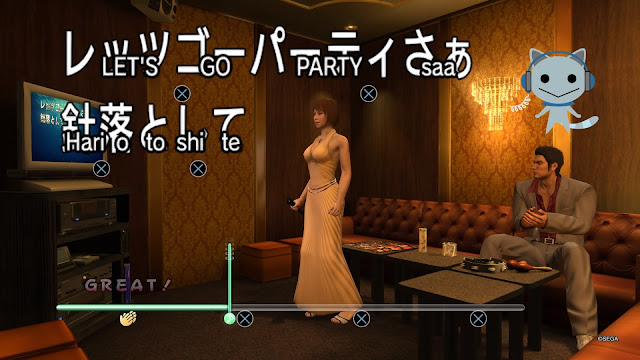WHERE THE WILD KIDS GROW
With Yakuza 3, the series once again hammers home the importance of upbringing. Orphans play a central role yet again, with series protagonist Kazuma Kiryu caught in the middle of a moral crossroads. The children at the heart of this story may grow into something good or something destructive, depending on whether society nurtures them—or abandons them to the rot of the urban jungle. It’s a familiar refrain for the series, but one that bears repeating.
So does the peculiar charm of the Yakuza experience itself. Every entry is broadly similar, which paradoxically makes it endlessly entertaining. You might accept a stranger’s bizarre proposition, unsure whether he’s scamming you (probably) or genuinely desperate. You might end up in a street brawl. Or you might spend the evening drifting from bar to bar, playing darts or pool, ducking into a SEGA arcade, only to wind up alone in a karaoke booth, singing your heart out.
The main story often recedes into the background, simply because the substories are so much more entertaining. Their life lessons are delivered with such complete lack of subtlety that they become irresistible. No one ever learns anything gently—you beat wisdom into dimwitted skulls again and again. Many of these characters return in later substories, some even carrying their misfortunes across multiple games. Remember the lovelorn, suicidal millionaire from Yakuza Kiwami? He and his manipulative fiancée are back here to (maybe) conclude their sorry tale.
Ryu Ga Gotoku Studio has usually excelled at character work, but in Yakuza 3 the writers also manage to anchor those characters in a surprisingly solid main plot. The game takes itself more seriously than earlier entries, leaning into politics and straight-faced drama rather than constant operatic gangland twists. Those excesses still surface occasionally, but far more sparingly. All told, Yakuza 3 boasts the strongest main story in the series since Yakuza 0.
Unfortunately, the introduction undercuts itself by cutting back and forth in time. This slightly heightens tension but needlessly complicates the chain of events. Eventually, it becomes clear that powerful interests within the Tojo Clan, the CIA, and a rival yakuza faction are all vying for the land deed to Kiryu’s orphanage. You’re forced to defend it at all costs. The broad strokes are compelling, but keeping track of the finer details—especially as the plot balloons into a global conspiracy—can be taxing.
As a PlayStation 4 HD remaster, Yakuza 3 is also the oldest entry in the franchise I’ve played. Its engine feels like a direct descendant of the PlayStation 2 era, and it shows. The presentation is dated in almost every respect, from stiff animations to invisible walls that recall early 2000s level design. Even the fonts and menu sound effects feel antiquated.
This especially hurts the mini-games. Bowling, pool, and baseball are serviceable at best. Darts is trivially easy, while karaoke swings too far in the opposite direction, with abrupt prompts that leave little reaction time. I sampled most of them once or twice and felt no urge to return—though to be fair, mini-games have never been the main draw for me.
There are a few new diversions of mixed quality. Golf is a competent simulation I largely ignored out of personal disinterest. Boxcelios, a 3D side-scrolling shooter in the SEGA arcade, is a fun oddity—perhaps the remnants of a larger abandoned project. The massage parlor is a pointless, suggestive distraction. The hostess maker is a tedious, watered-down precursor to the excellent cabaret club management found in Yakuza 0 and Yakuza Kiwami 2.
My favorite addition is the photo-blogging side activity. By photographing slapstick incidents around town, Kiryu learns new combat techniques. Witness a man taking a baseball to the groin, and you unlock a crotch-crushing move. Catch a judo expert fending off a lecher, and you gain a useful throw. It’s silly, inventive, and perfectly in tune with the series’ humor.
The older engine also simplifies the RPG systems. Combat upgrades are reduced to four categories—body, tech, soul, and heat—making fights more straightforward but less engaging. Boss battles are the main exception, often requiring you to work around constant blocking or weapon use. Still, experimentation with environmental weapons and unique heat actions uncovers plenty of hidden comedy.
Ironically, this step backward restores some of the series’ old charm. Much of the dialogue, both in the main story and substories, is text-only, accompanied by exaggerated animations and brief vocal reactions. Street punks taunt you with ridiculous zig-zagging bravado before a fight, and cartoonish anime grunts suit the crude character models perfectly. It’s not subtle—but subtlety has never been the point. Four games into a franchise like this, expecting restraint feels misguided.
The Yakuza series has released new entries at an astonishing pace, and its consistent quality is remarkable. Reusing Kamurocho with only minor changes turns it into a second home. When someone sends me to Nakamichi Street or the Champion District, I know exactly where to go. I instinctively recognize which characters to avoid and where a substory is likely unfolding.
Repetition is part of the magic. After spending so much time in Kamurocho, you start to feel like the legend yourself. Everyone knows the Dragon of Dojima, and once they realize who stands before them, their tone shifts immediately. When Kiryu offers advice on how to survive—or succeed—in his city, it carries real weight. After all, what truly replaces experience, repetition, and the long labor of mastering one’s craft?











Comments
Post a Comment